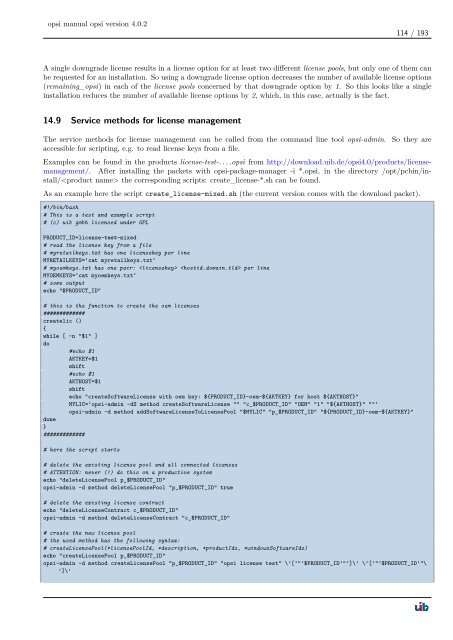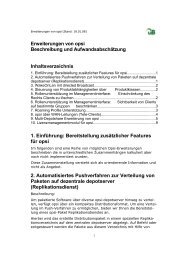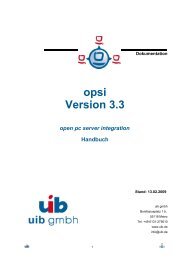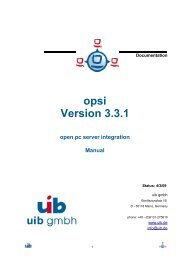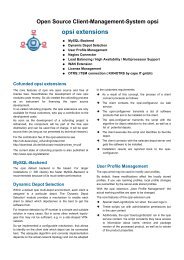opsi manual opsi version 4.0.2 - opsi Download - uib
opsi manual opsi version 4.0.2 - opsi Download - uib
opsi manual opsi version 4.0.2 - opsi Download - uib
You also want an ePaper? Increase the reach of your titles
YUMPU automatically turns print PDFs into web optimized ePapers that Google loves.
<strong>opsi</strong> <strong>manual</strong> <strong>opsi</strong> <strong>version</strong> <strong>4.0.2</strong><br />
114 / 193<br />
A single downgrade license results in a license option for at least two different license pools, but only one of them can<br />
be requested for an installation. So using a downgrade license option decreases the number of available license options<br />
(remaining_<strong>opsi</strong>) in each of the license pools concerned by that downgrade option by 1. So this looks like a single<br />
installation reduces the number of available license options by 2, which, in this case, actually is the fact.<br />
14.9 Service methods for license management<br />
The service methods for license management can be called from the command line tool <strong>opsi</strong>-admin. So they are<br />
accessible for scripting, e.g. to read license keys from a file.<br />
Examples can be found in the products license-test-. . . .<strong>opsi</strong> from http://download.<strong>uib</strong>.de/<strong>opsi</strong>4.0/products/licensemanagement/.<br />
After installing the packets with <strong>opsi</strong>-package-manager -i *.<strong>opsi</strong>, in the directory /opt/pcbin/install/ the corresponding scripts: create_license-*.sh can be found.<br />
As an example here the script create_license-mixed.sh (the current <strong>version</strong> comes with the download packet).<br />
#!/bin/bash<br />
# This is a test and example script<br />
# (c) <strong>uib</strong> gmbh licensed under GPL<br />
PRODUCT_ID=license-test-mixed<br />
# read the license key from a file<br />
# myretailkeys.txt has one licensekey per line<br />
MYRETAILKEYS=‘cat myretailkeys.txt‘<br />
# myoemkeys.txt has one pair: per line<br />
MYOEMKEYS=‘cat myoemkeys.txt‘<br />
# some output<br />
echo "$PRODUCT_ID"<br />
# this is the function to create the oem licenses<br />
#############<br />
createlic ()<br />
{<br />
while [ -n "$1" ]<br />
do<br />
#echo $1<br />
AKTKEY=$1<br />
shift<br />
#echo $1<br />
AKTHOST=$1<br />
shift<br />
echo "createSoftwareLicense with oem key: ${PRODUCT_ID}-oem-${AKTKEY} for host ${AKTHOST}"<br />
MYLIC=‘<strong>opsi</strong>-admin -dS method createSoftwareLicense "" "c_$PRODUCT_ID" "OEM" "1" "${AKTHOST}" ""‘<br />
<strong>opsi</strong>-admin -d method addSoftwareLicenseToLicensePool "$MYLIC" "p_$PRODUCT_ID" "${PRODUCT_ID}-oem-${AKTKEY}"<br />
done<br />
}<br />
#############<br />
# here the script starts<br />
# delete the existing license pool and all connected licenses<br />
# ATTENTION: never (!) do this on a productive system<br />
echo "deleteLicensePool p_$PRODUCT_ID"<br />
<strong>opsi</strong>-admin -d method deleteLicensePool "p_$PRODUCT_ID" true<br />
# delete the existing license contract<br />
echo "deleteLicenseContract c_$PRODUCT_ID"<br />
<strong>opsi</strong>-admin -d method deleteLicenseContract "c_$PRODUCT_ID"<br />
# create the new license pool<br />
# the used method has the following syntax:<br />
# createLicensePool(*licensePoolId, *description, *productIds, *windowsSoftwareIds)<br />
echo "createLicensePool p_$PRODUCT_ID"<br />
<strong>opsi</strong>-admin -d method createLicensePool "p_$PRODUCT_ID" "<strong>opsi</strong> license test" \’[’"’$PRODUCT_ID’"’]\’ \’[’"’$PRODUCT_ID’"\<br />
’]\’


